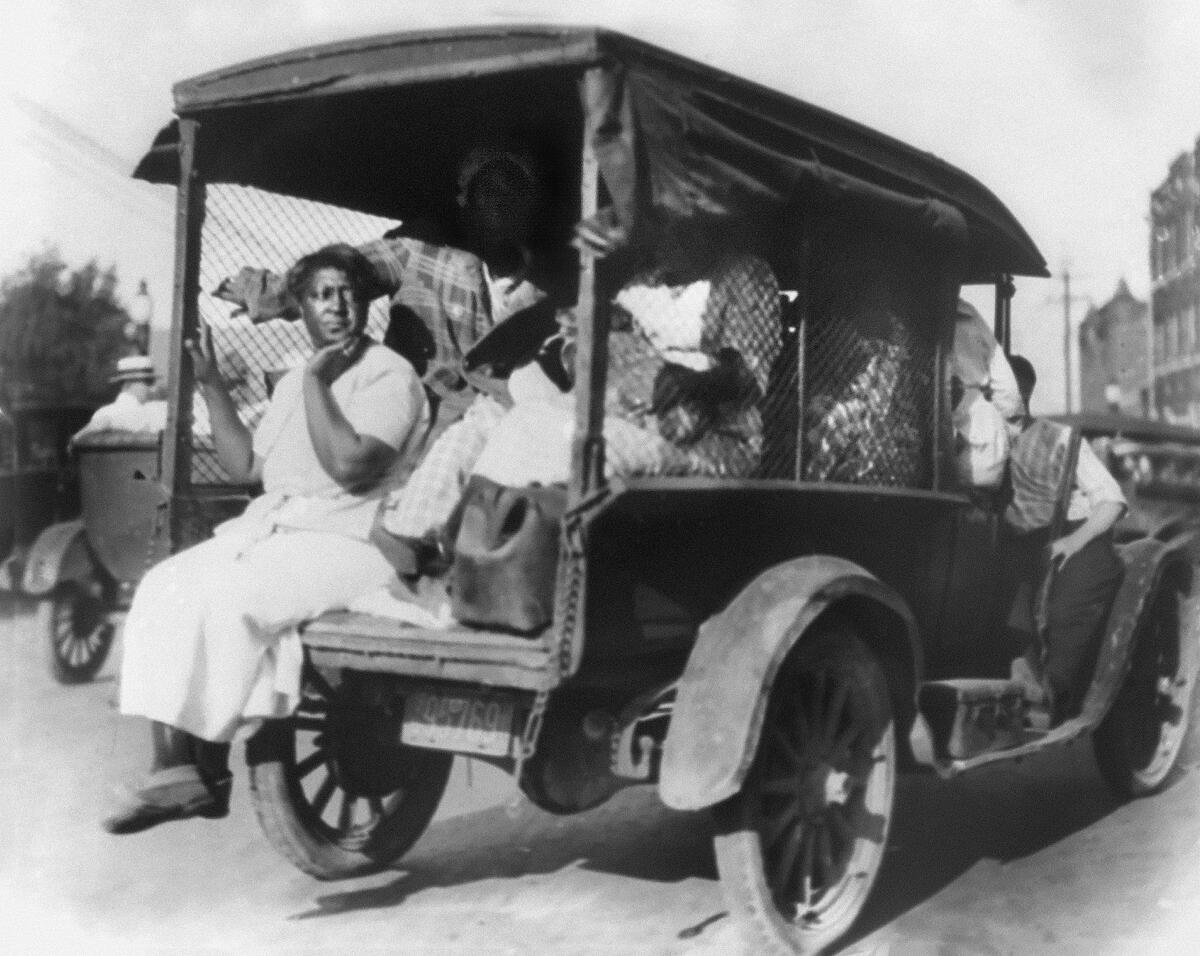They were told white men ‘wouldn’t relate to’ the Tulsa Race Massacre. Then came ‘Watchmen’

When filmmaker Jonathan Silvers got the idea a few years ago to make a documentary about the 1921 annihilation of Black Wall Street in Tulsa, Okla. — the most deadly and destructive racist attack in U.S. history — he imagined he would have no trouble finding a distributor.
He was wrong.
The Tulsa Race Massacre was a little-known chapter of the country’s troubling history of race relations, in which a prosperous and independent Black community called Greenwood was savaged by angry white people who killed hundreds of Black residents and set fires to numerous homes and businesses.
The attack, ignited by a false accusation of assault, has been ignored or downplayed for decades in school curricula, which Silvers thought would give a documentary examination even greater value.
“I was saddened beyond words that our country had suppressed a key component of our history, a dark era that helps us understand where we are now and who we are now,” Silvers said of his interest in making the film.
“Them,” about a Black family fighting racism and supernatural forces in the 1950s, includes warnings about its graphic depictions of racist violence.
But when he and his producing team started pitching the project in 2019, he ran into a wall.
“We tried for at least a year to interest a number of broadcasters in the project, and none of them at the time recognized the nature of what we were doing,” Silver said. “We weren’t just exposing a mass atrocity, but a mass atrocity that had been hidden from history.”
It took a group of quirky masked superheroes to reverse that reluctance: In its premiere episode in October 2019, HBO’s Emmy-winning miniseries “Watchmen” dramatically depicted the violence of the massacre, illuminating it with a brighter spotlight than it had ever received.
Adapted from Alan Moore’s hit graphic novel, “Watchmen” reinterpreted its tale about a group of ragged superheroes by mixing science fiction, contemporary themes and real historical events. The first episode begins with an explosive reenactment of the attack on Greenwood, including Black men being dragged by cars through the streets and planes dropping bombs on the community.
This Memorial Day weekend, the centennial of the riot, will be marked by at least four in-depth documentaries, including “Tulsa: The Fire and the Forgotten,” Silvers’ project that he developed with veteran Washington Post reporter DeNeen L. Brown and preeminent war crimes investigator Eric Stover. The film will air May 31 on PBS.
The other documentaries airing this weekend are “Tulsa Burning: The 1921 Race Massacre” (History, May 30), a two-hour film directed by Emmy winner Stanley Nelson (whose films include “Freedom Riders”) and Marco Williams and executive produced by NBA star Russell Westbrook, among others; “Dreamland: The Burning of Black Wall Street” (CNN, May 31), a two-hour film from director Salima Koroma (“Bad Rap”), produced in collaboration with NBA superstar LeBron James’ Springhill Entertainment Co.; and the two-part docuseries “The Legacy of Black Wall Street” (premiering June 1 on Discovery+ and OWN). On June 18, National Geographic will air another project featuring Brown, “Rise Again: Tulsa and the Red Summer.”
Silvers was not the only filmmaker to meet resistance to a Tulsa documentary in just the last few years.
“Nobody wanted it. Everyone seemed scared or claimed that the demographics were not right,” said Koroma, who started pitching her project in 2017. “One response that really stuck with me was someone telling me that the demographic of 30- to 55-year-old white men would not relate to the story.”
For ‘The Underground Railroad,’ about the harrowing escape from slavery, director Barry Jenkins took a novel step: hiring a mental health counselor.
Using different approaches and perspectives that occasionally overlap, the documentaries dive not only into Tulsa’s horrific past, but also the efforts to cover it up through the decades and how the riot relates to the Black Lives Matter protests that were reignited last year after the killing of George Floyd.
Several include interviews with descendants of victims of the massacre. Also featured are black-and-white photographs and film footage of Greenwood in its prime before the riot, as well as some of its most prominent entrepreneurs, who built successful hotels, theaters, stores and other businesses.
Some of the filmmakers said the examination of the riot has become even more timely due to the fiery racial tensions that have erupted in the last year, sparked by ongoing police brutality against unarmed Black people, a divisive presidential election and the COVID-19 pandemic’s disproportionate effect on Black and Latino people.
“I hope people will be moved by the systematic destruction and devastation and see the parallels with today, which are obvious and evident,” Nelson said.
“Watchmen” creator Damon Lindelof, whose series helped spark the new wave of interest, said he learned of the attack from the writing of African American author Ta-Nehisi Coates (“Between the World and Me”), a frequent chronicler of Black identity and white supremacy.
“I consider myself a student of U.S. history and I thought, ‘How did this slip through the cracks?’” Lindelof said in an interview when the drama premiered. “I felt incredible shame and guilt.”
Brown called “Watchmen” a “catalyst” that made a big difference in the riot getting more attention. Since then, the massacre also has been depicted in HBO’s “Lovecraft Country,” and MTV Entertainment Studios announced on Monday a scripted limited series on the subject in the works, with actors Courtney B. Vance and Angela Bassett signed on as producers.
“When ‘Watchmen’ aired, there were a lot of smart people who said, ‘How come I never heard about this?’” Brown said. “They said, ‘Did this really happen?’”
Brown was one of the first journalists who started digging into Tulsa’s troubled past, and the coverup thereof, when she visited her father in Tulsa in 2018. She recalled being disturbed by the gentrification of the community that was once hit by rioters.
“I saw a yoga studio, all this development, and I thought it was strange to see this on the site of this horrific incident,” she said. She wrote a story about unmarked mass graves of victims of the carnage that wound up on the front page. Regina King, who starred in “Watchmen,” tweeted out that story when folks asked her if the events shown in the series were true.
HBO’s “Watchmen” examines race, white supremacy and police brutality. Sunday night’s series premiere has creator Damon Lindelof asking, “Should we have done it?”
Silvers said, “‘Watchmen’ changed things a little bit. I’m deeply conflicted about the cartooning of American history and culture, but people started paying attention. It made them curious. And when the protests of last summer made it concrete that racial violence is not an episode but a continuum of the Black experience, that’s when everyone started to pay attention.”
Most of the filmmakers did not seem to be concerned about so many documentaries on the Tulsa Race Massacre appearing at the same time, feeling that the films would more likely complement each other.
“There are many films about other events such as the Holocaust,” Nelson said. “I’m not concerned at all.”
Added Koroma: “In America, we often tell Black stories one way, while other stories are told several different ways. My film is not able to tell the whole story. It helps my film to have these other films because it gives it a greater context. I don’t see them as competing, and I can’t wait to see the other ones.”
More to Read
The complete guide to home viewing
Get Screen Gab for everything about the TV shows and streaming movies everyone’s talking about.
You may occasionally receive promotional content from the Los Angeles Times.







